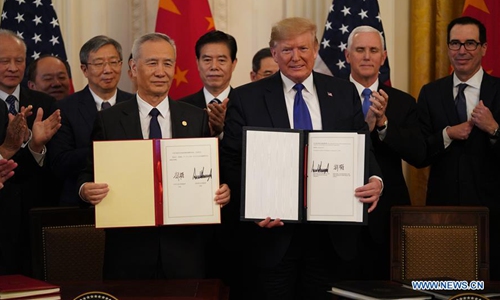Progress continues on China-US phase one deal
By Xie Jun Source:Global Times Published: 2020/4/12 20:13:40
Trade teams maintain contact, buying uninterrupted by COVID-19

Chinese Vice Premier Liu He and US President Donald Trump show the signed China-US phase-one economic and trade agreement during a ceremony at the East Room of the White House in Washington D.C. on January 15. Photo: Xinhua
China sees to its responsibility in carrying out the phase one trade deal and continues to buy from the US despite the coronavirus pandemic, according to Chinese Ambassador to the US Cui Tiankai on Sunday.
The message, revealed by Cui, could be a signal that China and the US might soon enhance communication, maybe via videoconference calls, over detailed implementation of their deal, experts said.
In an interview on the US broadcast Gzero World, Cui said that China is "doing its part" to carry out the agreed terms, such as still purchasing some agricultural products from the US and removing some of the restrictions on foreign companies in China's financial market.
"As far as I know, even in the last few weeks, when we are faced with this very serious, critical situation, people are still working on the implementation of this phase-one deal," said Cui in the interview.
Gao Lingyun, an expert at the Chinese Academy of Social Sciences who advises the government on trade issues, said that China started purchasing US agricultural products like beef and pork at end of 2019 and it has not halted such purchases this year, although the procurement process has been extended by more stringent quarantine measures.
"I don't think China has any problems fulfilling its promised purchasing volume this year, as long as the US doesn't obstruct trade," Gao told the Global Times.
China has committed to buying an additional $200 billion worth of US goods and services by the end of 2021, as agreed in the trade deal.
Song Guoyou, deputy director of the Center for American Studies under Fudan University, told the Global Times that Chinese and US economic and trade teams have maintained close contact "in every way" despite the pandemic, and talks have not been interrupted.
"Although COVID-19 has brought rising uncertainties, the two still have strong 'political willingness' to carry out the phase one trade deal," Song said, noting that the two sides have not officially talked about adjustment to the trade deal because of the pandemic.
Ni Feng, a deputy director of the Institute of American Studies of the Chinese Academy of Social Sciences, said this should be a sign that China and the US will speed up discussion over implementation of the trade deal, via video-conference calls and other means, such as how to cope with the impact of the pandemic and the next execution measures.
However, with all those positive signs, experts are not resting easy about how China and the US will settle their trade disputes.
Gao, for example, said that some US politicians might take steps to thwart the execution of the phase one deal.
He also said that progress in the second-phase talks will be very difficult, partly because the pandemic has distracted the US, and partly because distrust is also rising on China's side as the US often made changes during the phase-one negotiations.
"As far as I know, communication is going on but neither side has formally got down to talks," Gao said.
Ni predicted that the second-phase talks won't start until after the US presidential election in November.
Cui also described the China-US relationship as "complex and comprehensive," but stressed that the two countries' top leaders have maintained good communication and agreed that China and the US should work together.
"This is the time for solidarity and cooperation...I certainly don't want to see any escalation of tensions between our two countries at any time, and especially at this critical moment," Cui said, adding that both countries should reject any attempt to "take political advantage of other people's suffering."
Shen Weiduo contributed to the story
Posted in: ECONOMY,BIZ FOCUS